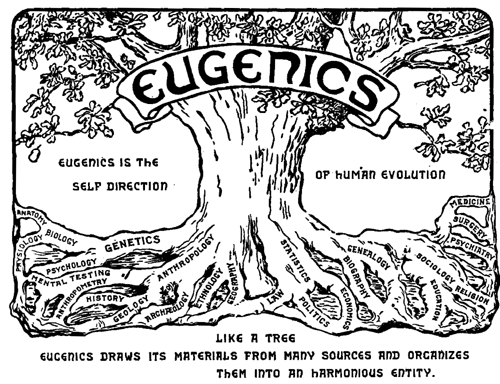Morality of Eugenics

Scientists and doctors would encourage those they believed to be fittest of people to reproduce more in hopes of creating a new generation of humans with more intelligence, strength, beauty, and health.
“Some people just shouldn’t have kids,” people may say. Throughout history, these words have been uttered by many when they do not agree with how certain people may raise children or their reasoning on why. However, no matter how it is spun, saying a group of people should not have children is a part of eugenics.
The term “eugenics” was coined in 1883 by Sir Francis Galton who used the Greek word eugenes which is “good in birth” or “good in stock” according to the National Human Genome Research Institute. As can easily be guessed, the history of eugenics is linked to racism. Used for “racial breeding” and letting the undesired groups of people simply “fade away,” eugenics was used all over the world from the United States, France, Argentina, Italy, Mexico, and many more. Scientists and doctors would encourage those they believed to be fittest of people to reproduce more in hopes of creating a new generation of humans with more intelligence, strength, beauty, and health.
How did that work? The act of eugenics can be carried out by birth control, genetic screenings, sterilization, marriage restrictions, segregation by both races and mental illness. In the 20th century, according to the University of Michigan, 60,000 people were forcibly and sometimes unknowingly sterilized in 32 states and they were mostly those of minority groups. During World War II, Nazi Germany used the idea of eugenics to try and wipe out an entire group of people.
Often targeting those with disabilities whether mentally or physically, eugenics aimed for “perfection” of the human race.
This can be seen today with programs like CRISPR, Clustered Regularly Interspaced Short Palindromic Repeats, a genome editing technology! With the advertisement of allowing people to change the odds of their baby having certain features and avoiding certain health defects, it seems promising! If a parent could possibly keep their child from being blind, being born with a genetic disorder, or more, why wouldn’t they? However, this may come with other complications. Is it worth the risk? And if technology is this advanced, can some parents change the eye color of their unborn child? What about hair color? Skin color? These abilities to alter another human being treads in the realm of God like capabilities. It must be remembered that the act of eugenics would cause a loss in genetic diversity, and cause a huge issue of immorality of the act amongst humans which is already a struggle. It’s almost like “playing God!” Should people be able to do that?






